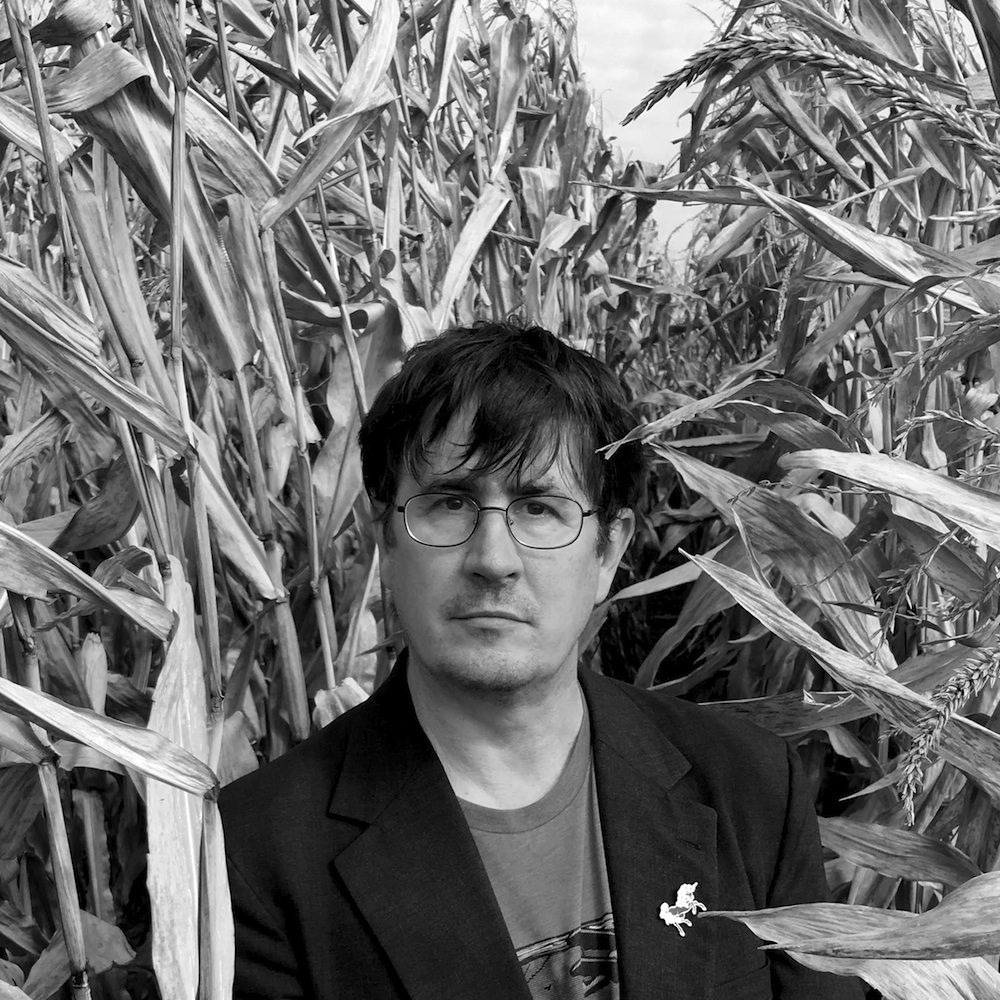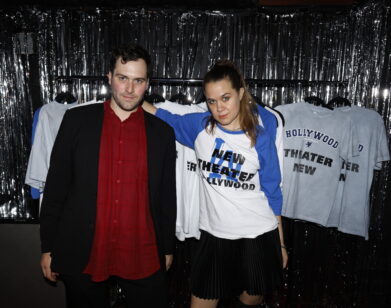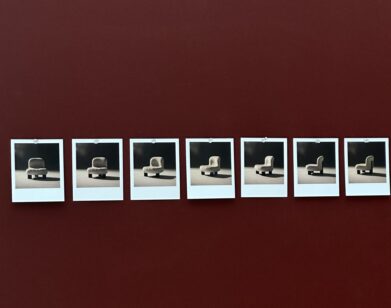John Darnielleâ??s Cartography of Grief

ABOVE: JOHN DARNIELLE. PHOTO COURTESY OF BRANDON EGGLESTON.
“There was a melancholy to it you could catch if you weren’t trying too hard,” a character in John Darnielle’s new novel, Universal Harvester, remarks about the winter in a small town in Iowa. Just like a snow globe captures something beautiful and makes it sad, so too does Universal Harvester (FSG)—a story of grief laced with a bizarre and seductive mystery, trapped in the static and suffocating landscape of the Midwest. The book begins in the late ’90s with Jeremy, a young employee at a Video Hut in Nevada, Iowa, languishing in a humdrum existence brought on by the death, six years ago, of his mother. Things begin to change when strange videos clips start appearing on returned tapes. As Jeremy unravels the mystery of the found footage, the narrative turns backwards and sideways to the origin story of the films and another family’s domestic horror, one even darker than Jeremy’s own.
Darnielle, who is based in North Carolina, is best known as the founder of the band the Mountain Goats, which has been active since 1991. (He is its only constant member.) His music—emotionally charged, with its attention to lyricism and honesty—has earned him an unusually devoted following. In 2014, he published his debut novel, Wolf in White Van, a twisting mediation on loneliness for which he received a National Book Award nomination. We recently spoke to Darnielle by phone to discuss Universal Harvester and his theories about place.
MATT MULLEN: I read that you call this book a “cartography of grief.” Can you explain what you mean by that?
JOHN DARNIELLE: I’m pretty fond of that phrase. I think grief is a huge subject; it’s one of the things that everybody is going to confront in one way or another. There’s been a lot of books written about how Americans have an odd way of trying to defer grief or minimize the need to grieve. People used to have a lot more ritual grief in their lives. For the most part, we think of it as a strictly temporal process: you grieve for a time and then you’re over [it], but it’s also a spatial process. It travels across a map. I’ve always loved maps and thinking about place and how it informs people, so that’s what I meant by that. It’s the tracking of a grief across distances.
MULLEN: I get the grief part, but for something cartographically inspired, the book is very meandering. There’s no linear path, or direction.
DARNIELLE: Well, it’s not linear, but neither are most maps; they go across the Earth, and Earth doesn’t have any straight lines on it—that I know of. We try to put straight lines on things and in fact in Iowa, the highways that go from Collins to Nevada, those are very straight lines. But the book is an honest cartography of an actual Earth surface.
MULLEN: That makes sense. How did you approach the structure when you wrote this? That’s one of its most interesting features.
DARNIELLE: I’m glad it worked out. [laughs] I’m more and more into outlining, but I always have to start from an improv place, from a place of not having any idea of what I’m going to do. I guess I could start with an outline, but it would feel weird because I’ve always been really resistive to them. I have to start cold. I start with whatever an idea is—just writing a scene and seeing where it goes. At some point along the line, I go, “Well, it looks like you’ll be spending a little bit of time here, so write an outline,” but that outline is usually fairly spartan. In Wolf in White Van, I just had these chapter titles, and then as it progressed, I started giving one-line summaries to what would be in the chapter. This time, I wrote the first chapter or so and then I started loosely outlining the first half, the first quarter, and when it built to a space I didn’t expect it to go to, I started outlining the next part.
When I went back to western Iowa, to Lisa Sample’s life, that was all a big surprise. I didn’t see that coming. You ask yourself a lot of questions as you go. I said, “Well, what don’t we know yet? We don’t know where Lisa is from”—and everybody in Iowa knows where they’re from. So, I thought, “Well, where is she from?” She’s from Tama. “Well, who’s her family?” And once I got that question, I also looked harder at what I had done, because we know who everyone’s family is here. We know where Mom went. We know what’s up with Dad. I started asking questions about Lisa and that sort of opened up into the book.
MULLEN: What was the original genesis of the book, the first idea?
DARNIELLE: It’s pretty simple. I was thinking about how people talk at Iowa family reunions, specifically the ones I’ve been to. I haven’t been to everybody’s family reunions, but I’ve been to my wife’s and they always do this thing where they talk about who wound up where—and it’s only the who and where. There is as little why and how as possible. It’s tracing. And it’s kind of numbing. It’s a very intense thing to listen to, it’s very technical, but it has this comforting rhythm to it that I think is about a pretty profound realization that when you know where somebody is, you know the most important thing about them. You know they’re safe and you know they’re alive. You have a sense of them once they are somewhere. You don’t actually need to know how they feel. You don’t actually need to know how they’re paying their rent. For me, coming from California where everybody is pretty nomadic, it was an interesting insight. I was just trying to write one of those conversations.
MULLEN: This is a Midwestern sensibility?
DARNIELLE: All I really know about is Iowa, so I can’t really say whether it’s the same in Minnesota or Illinois or Nebraska, but I do know that in northern Iowa, that’s a conversation that seems to take place at reunions.
MULLEN: Why do you think that is?
DARNIELLE: It could just be my family for all I know. [laughs] I’m generalizing from a very small subset, but I don’t think it’s just my family. For one thing, I think it’s because in Iowa, for the longest time, people didn’t venture out. In Iowa, I feel like there has been for many years a pretty tight connection to the state, to being Iowan, to being from there, even though those borders are a little blurry; southern Minnesota isn’t all that different from Iowa and neither is northern Missouri.
MULLEN: I’ve been poking around online reading the initial reactions to the book and the word atmospheric keeps coming up. You do pay a lot of attention descriptions of place, whether it’s driving on the highway or the prairie or the video store. Why is rendering place so important to you and how do you make it so evocative?
DARNIELLE: There’s a personal response and then an aesthetic response that I have to why place is important to me. I think it’s because when I became conscious of being a person, when I was very small, I knew that I was from Indiana, but I had never seen Indiana. I was born there, but we moved when I was, like, a year old. I always had a sense of a place that was far away from where I was. I would research it and find out about it and I remember on Christmas morning I used to always call Indiana to find out what the weather was like; to see if it was snowing or not. My family, before the divorce, moved several times, and after that we moved a whole bunch more times, and so I don’t have an anchor to a single place. Probably as a result of that, I’m a little more attenuated to when people do feel close identification to place, whether they say it out aloud or not. I think that there’s a sort of local patriotism that is deeper than national patriotism.
MULLEN: I have to mention this one scene that’s been stuck in my brain. It was when Irene eats the kitchen scraps with her fingers.
DARNIELLE: Outside the church. Yeah.
MULLEN: I kept wondering how someone could do something like that, but then right after I read your book, I happened to read a book about the history of Jonestown—a nonfiction account [The Road to Jonestown: Jim Jones and Peoples Temple, by Jeff Guinn]. After reading that, I sort of understood how people can be driven to do such illogical things, such as willingly eat kitchen scraps. So I’m curious, did you research cults beforehand? Have you always been interested in them?
DARNIELLE: Oh, yeah. I’ve had a life-long fascination with cults my entire life. My friend Joe in grade school explained to me the concept of brainwashing as it was popularly understood circa ’75/’76. It sounded like this Satanic Panic-style talk: “Somebody starts talking to and the next thing you know your brain has been washed!” [laughs] Which, it’s not actually like that. I was actually involved with the Hare Krishnas for several years and I got that way because I was really curious. You read something that’s interesting to you and some of it aligns with your values and some of it seems really exotic and weird, and you’re curious so you explore it more. If you’ve always been a spiritual seeker, you approach it. Actual cults that are autocratic and that overwhelm their people, they’re few in number, but they do exist. In the present political situation, it’s an interesting phenomenon to look at: what is the appeal of an autocratic leader? Why do people want somebody who yells at them? For most of us, that’s so hard to understand. Who wants that? I think there are a lot of people for whom that fulfills some kind of need.
MULLEN: Did you have any literary inspirations for the book, and if so, what were they?
DARNIELLE: I don’t sit down and say, “I want to sound like so-and-so,” but there was one writer whom at one point I was thinking about dedicating the book to, and that’s Robert Aickman. He’s a horror writer. He wrote some of the stories that left a huge impression on me when I was 13 and 14. The main thing about them was that he was okay with the reader feeling unsettled, not knowing what happened. It’s an important moment as a reader, I think, when you can forget the question of whether you need to know what happened. Some people really want hard explanations. I’m the other way. I like mysteries. I don’t want to frustrate people. I don’t want people to feel like they got no answers, but I want to approach the mystery and sit with it. That’s the point. Even when you get a hard answer, when you get a good answer, “Here is who Lisa is and here is what she was doing,” there is still mystery in it and there is still some sense of the unknowable. Alain Robbe-Grillet is another. He was a French thinker and novelist. He was all kinds of things, some of it pretty scandalous, but for the most part his novels play around with your idea of what you think you already know when you’re reading something. He has a book called Jealousy. It’s a boring book, but it’s a great book because it’s narrated by somebody who is in the story, but he never refers to himself in the first person at all. You have to read the back cover to even know that’s the case. The point of it is because his wife is having an affair and Grillet is talking about the erasure of the self that happens in this kind of situation. It’s reality blurring, but it seems to take place in the same world that we are all in really. That has made a big impact on the way I think about books.
MULLEN: It’s a tricky balance to pull off, between leaving space for the unknown and not frustrating the reader.
DARNIELLE: I’m lucky to have John Hodgman reading my stuff from time to time. He’s the guy who says to me, not sternly, “I think you want to pay the reader back for their investment in some way. You can’t always just drop them off at the door and say, ‘Oh, there’s something inside!’ You don’t have to put an X-ray on what’s inside it, but you do have to open the box.”
MULLEN: Have you started a new piece of writing?
DARNIELLE: I’m always writing. I never talk about what I’m doing, but I’m always writing stuff. I don’t understand being idle; I don’t have an idle setting. I probably should develop one.
UNIVERSAL HARVESTER IS OUT TODAY FROM FARRAR, STRAUS, & GIROUX






